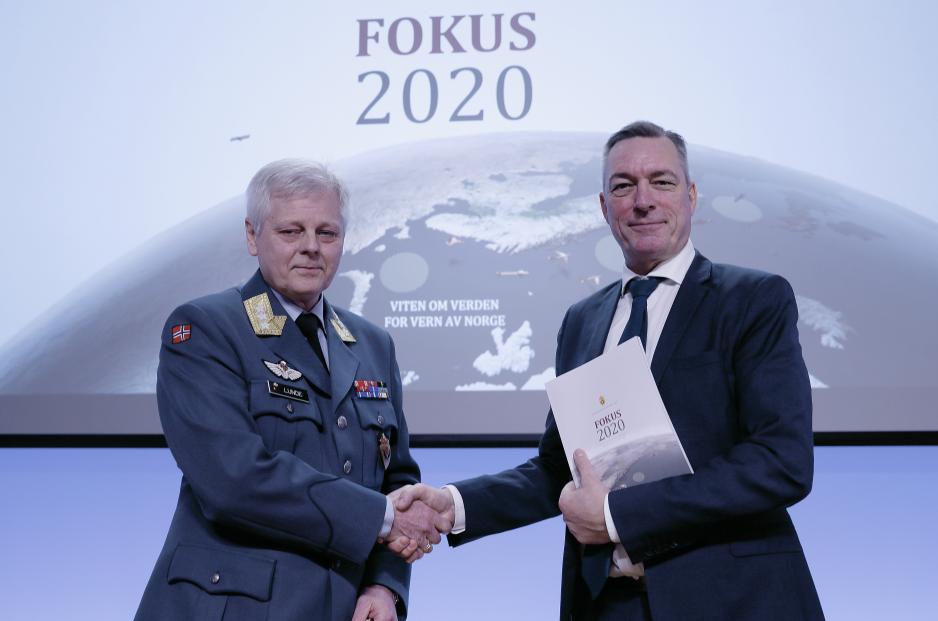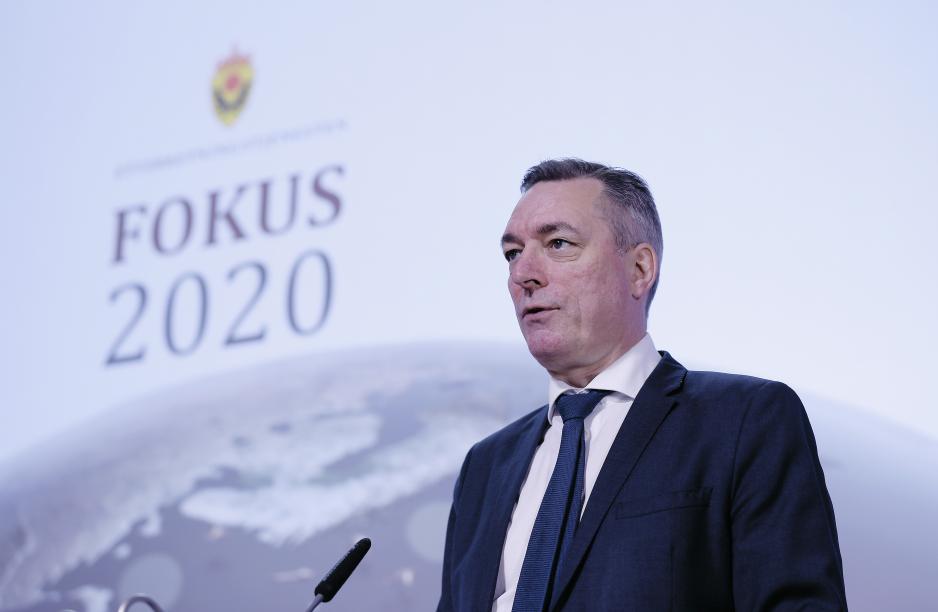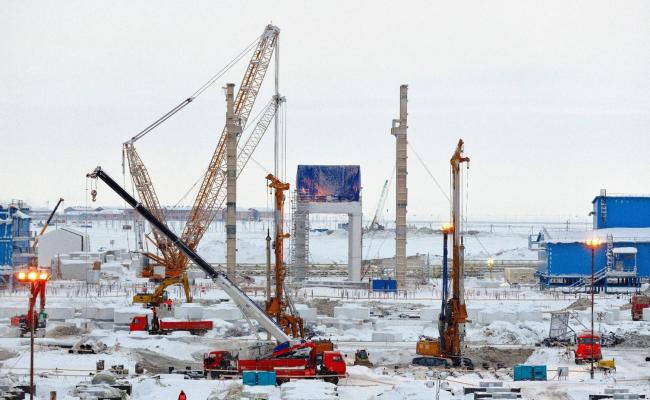Norwegian Foreign Intelligence Services: China and Russia the Biggest Threats Against Norway

Head of the Norwegian Foreign Intelligence Services, Lieutenant-General Morten Haga Lunde, Monday presented the Focus 2020 threat assessment report. Photo: Torbjørn Kjosvold/Norwegian Armed Forces
“The factors affecting Norwegian threat perceptions the most come from Russia and China”, said Lieutenant-General Morten Haga Lunde when presenting the foreign intelligence services’ threat assessment for 2020.
The intelligence services Monday presented its non-classified assessment of current security challenges for Norway in its report Fokus 2020.
The head of the foreign intelligence services, Lieutenant-General Morten Haga Lunde, at the press conference pointed at China and Russia as the biggest threats against Norway as per today.
“Russian and Chinese intelligence services intrude on all sectors of society in these countries. This is not a transition phase. The Russian and Chinese regimes are different, yet both move in a more authoritarian direction”, Lunde said when presenting the report.
Russia and China consider themselves to be in a lasting conflict with the USA as well as with parts of the West.
This is further expanded on in the report: “Both countries have political systems with close and intended ties between politics and economy, between state and private, and between civilian and military spheres. There is extensive intrusion of intelligence and security services into all sectors of these societies. Separating state and private interests and activities makes little sense when it comes to assessments mattering to Norwegian national security. This is not a transition phase. Russian and Chinese intelligence services intrude on all sectors of society in these countries. This is not a transition phase. The Russian and Chinese regimes are different, yet both move in a more authoritarian direction. They consider themselves to be in a lasting conflict with the USA as well as with parts of the West.”
Also read
The foreign intelligence services’ report “Fokus” [Focus] is one out of four threat and risk assessments published annually. The other three are published by the Police Security Services (PST), the National Security Authority (NSM), and the Directorate for Civil Protection (DSB).
Fears Russian weapon systems
Lunde amongst others referred to the Ocean Shield military exercise, which the Russians conducted in 2018, an exercise interpreted by many as an answer to the NATO exercise Trident Juncture.
“Ocean Shield has been the largest maritime exercise in 30 years in western direction”, Haga Lunde said.
The intelligence chief pointed out that major parts of the Barents Sea as well as the access between Svalbard and the ice edge are covered by Russian systems, and that Russia has permanently deployed coast defense systems on Franz Joseph Land and the New Siberian Islands, in addition to the Kola Peninsula, and that the time warning chain is extended with new far-reaching radars.
“While the development and addition of new capacities demonstrate how Russia is strengthening its defense, Russian military activity in our neighborhood since the summer of 2019 has been an ongoing demonstration of the concept’s emphasis on integration and scalability”, says the Fokus 2020 report.
The general message brought by Russian media is that Norway to an increasing extent is taking on the role as host and starting point for NATO’s militarization of the Arctic.

Norwegian Defense Minister Frank Bakke-Jensen received the Fokus 2020 report from intelligence chief Morten Haga Lunde. Photo: Torbjørn Kjosvold / Forsvaret
In Arctic, this will take the form of new submarines, surface vessels, planes and military bases. In addition, we should expect development and testing of new, advanced weapon systems in our neighborhood.
Digital China
As for China, the intelligence service’s concerns are more aimed at digital threats. Lunde pointed for instance at China’s enormous initiatives on 5G networks:
“This strengthens China’s intelligence gathering ambitions and capacity. The significance of this can hardly be exaggerated”, he said.
“The Digital Silk Road” lays the foundation for massive, global intelligence capacity. Controlling 5G networks, fiber cables and smart city systems gives the opportunity to collect vast amounts of data.
Norway is also a goal for the Silk Road strategy and Chinese interest in the Arctic will just keep increasing. Chinese direct investments illustrate the wide range of tools available for China, according to the intelligence services.
Fokus 2020 emphasizes that China has abandoned the idea of a demure international profile and has instead established itself as a traditional superpower.
“While Russia’s big power ambitions has consequences in our neighborhood, we see a China that is less restrictive in demonstrating force, and that increasingly wants to set the premises for international interaction. Nationalistic assertion takes over from emphasizing economic pragmatism as a guiding principle for Chinese foreign policy. In a speech presented by Xi just after the assumed position as the leader of China, it emerged that he bases his foreign policy thinking on the understanding of a “lasting battle between two regimes”. China has, just like Russia, an interest in challenging the USA-dominated world order.”
Russia turns to China
In last year’s threat assessment, the intelligence services warned that the conflict with the West would make Russia turn to China to a greater extent to find support for infrastructure developments.
Lunde believes that Russia will continue to work for closer relations to China in 2020, in particular in the form of economic and military cooperation.
The strong personal relationship between the two countries’ leaders is an important premise. In June 2019, state leaders Putin and Xi decided to upgrade the status of their bilateral relationship. During the year, several important cooperation projects were completed too, such as the new gas pipeline “The power of Siberia”, which will lead Russian gas to China for the next 30 years.
The country seeks alternative sources for capital, technology and investments in light of the lasting western sanctions.
It is further emphasized that new agreements have been signed about new, extensive projects, amongst them Chinese investments in Russian energy projects.
“Russia wants to diversify its energy export while the country simultaneously seeks alternative sources of capital, technology and investments in light of lasting western sanctions. In a time characterized by geopolitical confrontation with the West, it is also important for Russia to signal that the country is not isolated. Russia and China also has a joint interest in challenging a world order dominated by the USA.”

Defense Minister Frank Bakke-Jensen. Photo: Torbjørn Kjosvold / Forsvaret
Norwegian Defense Minister Frank Bakke-Jensen (Conservatives) argues that not only the government and the armed forces, but also the rest of society, has to take a stand in an increasingly complext threat siuation, in particular in light of the lasting tension between Russia and the West. He encourages both the publich and the private sector to pursue the theme.
"What does this mean to us? That is a good question, both on leadership meeting agendas as well as around the lunch table of large and important corporations, said the defense minister.
The Foreign Intelligence Services
- The [Norwegian] Foreign Intelligence Service is subject to the Chief of Defense, though its work is not limited to military issues.
- Its main tasks is to warn about external threats against Norway and prioritized Norwegian interests, support the Armed Forces as well as defense alliances to which Norway is a party, and to support political decision-making processes with information of particular interest for Norwegian foreign, security and defense policy.
- In this year’s assessment “Fokus 2020”, the service offers its analysis of status and expected development in geographical as well as thematic areas considered by the service to be of particular interest to Norwegian security and national interest.
This article was originally published in Norwegian and has been translated by HNN's Elisabeth Bergquist.


